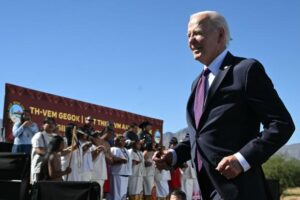Foot Locker Inc. revealed its latest effort to support BIPOC communities today, which will be done in partnership with the Local Initiatives Support Corporation.
Through its Foot Locker Foundation, the retail powerhouse will invest $3 million into its new, multi-city Community Empowerment Grant Program, which was created to empower BIPOC communities. The effort — which will span 12 areas where the company has a strong community presence — will prioritize nonprofit organizations that serve BIPOC youth and ones led by people of color that work to bridge gaps in health, wealth and opportunity throughout the country.
Foot Locker said it will spend the next two years providing grants that start at $20,000 through the program. These grants will support efforts that promote racial justice and equity, youth empowerment and career readiness, and community health.
“Inspiring and empowering youth culture is at the core of who we are. We are committed to investing in the next generation and their communities. Our hope is to drive meaningful change for those who have been underinvested in and underserved for too long,” Foot Locker Inc. chairman and CEO Dick Johnson said in a statement. “Through investments with local groups who know the communities and issues they face, we can create opportunity today and a brighter, more equitable future for the next generation.”
Foot Locker will launch the grant program on May 1, which is when LISC will seek proposals from a list of eligible cities. The list of eligible cities includes Atlanta, Baltimore, Chicago, Dallas, Detroit, Houston, Los Angeles, Miami, New York, Oakland, Philadelphia and San Francisco.
The new grant program, according to Foot Locker, was also created to address the limited resources BIPOC-led organizations often have compared to their white counterparts.
“This is what we mean when we talk about the systemic underpinnings of inequality. It isn’t something that people recognize at first glance, but it absolutely impacts the nonprofit sector’s ability to grow BIPOC leadership and serve people of color. And that has a ripple effect that runs through a host of social and Foot Locker — internal use only economic concerns, essentially offering fewer opportunities for families and communities to thrive,” LISC interim president and CEO Lisa Glover said in a statement.
LISC stated this funding is more important now than ever after a year of challenges created by COVID-19.
“Much like small businesses, community-based organizations have had their operations turned upside down because of the pandemic, with uncertainty about how to keep their staffs employed and protect their services offerings,” Glover said in a statement. “This grant program is meant to help deepen their programming so that young people can emerge from the significant stress of the past year—from COVID-19 to racial violence—and see opportunities for the future.”




